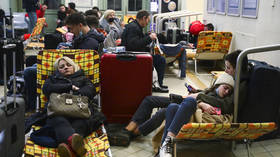Dating ads for ‘lonely Ukrainian women’ banned

The UK’s advertising regulator has banned online dating ads offering the chance to meet “lonely Ukrainian women” for being offensive. In a statement published on Wednesday, the Advertising Standards Authority (ASA) addressed three ads for online dating service SofiaDate, seen in May 2022.
The first one, which appeared on the Dorset Echo’s website, featured the image of a woman on a balcony with the text: “Ukranian [sic] Women. Meet Thousands of Lonely Ukrainian Women. Forget About Loneliness. Let Yourself be Happy.”
The second ad, seen on the website of Scottish newspaper The National, had the same image with a different text: “Ukranian [sic] Women. Connecting Singles Across the World to Their Ideal Partner.” The third, also on The National’s site, showed a woman in front of a sunset with the text: “Ukranian [sic] Women … Sofiadate.com.”
The complainants, “who felt the ads were inappropriate” amid the ongoing Ukraine conflict, challenged whether they were offensive, ASA said, adding that Astrasoft Projects Ltd., which trades as SofiaDate, has since removed the ads.
The watchdog ruled that the focus on Ukrainian women dressed “in the aforementioned manner,” as well as the references to their loneliness, highlighted their vulnerability and connected it “to their sexual appeal.”
“For that reason, we concluded the ads were likely to cause serious offence,” ASA said, ruling that the ads “must not appear again in the form complained of,” and issued a warning to SofiaDate.
The regulator said that it considered several factors. First of all, ASA claimed, “there was heightened sensitivity about references to the country, and the vulnerability of Ukrainian women had become an area of public concern.”
The watchdog also took into account the controversy surrounding the UK government’s ‘Homes for Ukraine’ scheme. The program, which encourages members of the public to share their homes with Ukrainian refugees, had raised concerns about the safety of single Ukrainian women. In April, the UN Refugee Agency (UNHCR) called on the British authorities to develop “a more appropriate matching process” to ensure that women and women with children are not matched with single men.
ASA also revealed that The National and Newsquest Media Group, trading as Dorset Echo, actually defended the ads, saying they were “ostensibly conventional,” did not refer to the conflict in Ukraine, were not partisan, and were “not unsympathetic towards Ukrainian women or the Ukrainian people in general.” However, the media holding responded to the complaints and removed the ads, admitting upon reflection that they could be inconsistent with its policy of refusing ads for prostitution and trafficking.













